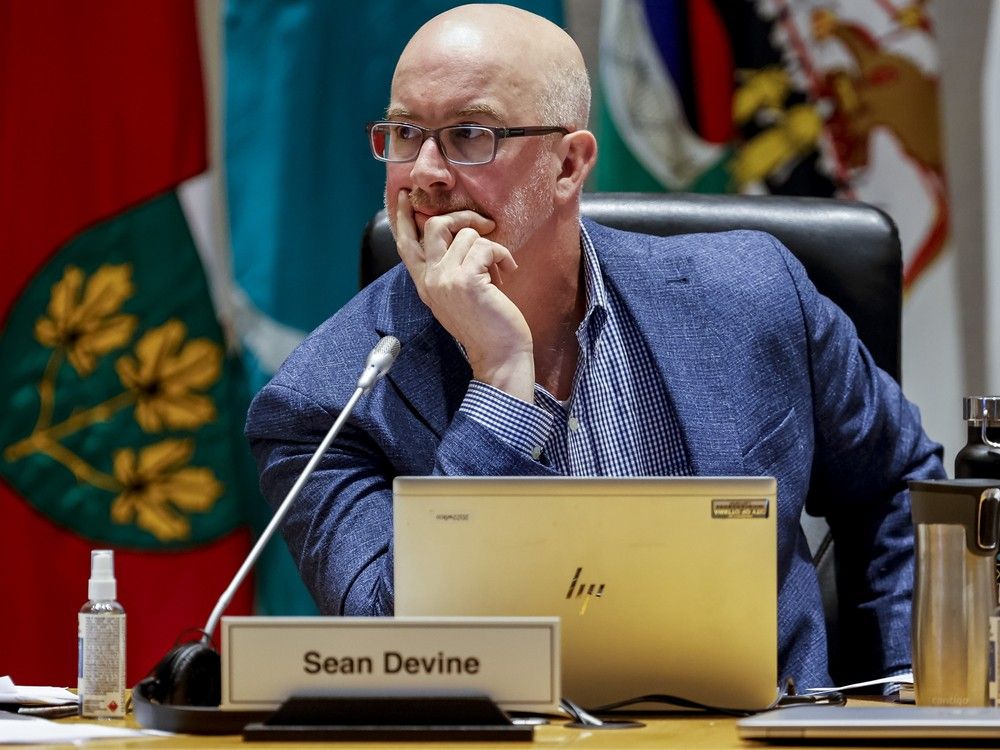A so-called
“bubble zone” bylaw to restrict protests
around vulnerable spaces has the support of Mayor Mark Sutcliffe, but is expected to face some opposition from city councillors when the motion is introduced at committee this week.
In a social-media post on May 13, Sutcliffe called for a “very careful, balanced, and strategic approach” to a bylaw that would restrict protests around schools, hospitals and places of worship.
“I’ve spoken to many, many different members of the community over the last couple of weeks, I’ve listened to their input … people from a cross-section of the community, people who work in education, in health care, faith leaders, community leaders, the United Way, and many other organizations and leaders,” Sutcliffe said following the May 14 council session.
“I think there’s a consensus that we need to do something, but that we need to be very, very careful about what we do. We need to protect the rights of people to demonstrate and protest in the nation’s capital,” he said. “We need to make sure that people are still able to exercise their constitutional right to demonstrate, but we also need to make sure that people are able to access … places like schools and places of worship.”
Sutcliffe said a motion to direct staff to draft the proposed bylaw would be introduced at the May 15 joint meeting of the emergency and protective services committee and the infrastructure committee.
Coun. Sean Devine is expected to voice his opposition to the proposal when it reaches the committee.
“A bubble zone bylaw would be a costly and potentially fruitless process that could put the city at legal risk. Besides, the feds and province are each already advancing legislation on this matter,” Devine wrote in a social-media post responding to the mayor’s statement.
“It is unreasonable to pursue this while legal challenges play out in other cities that have enacted similar bylaws. A far more prudent and responsible approach would be to await outcomes of these court cases, along with actions from upper levels of government.”
Devine, along with fellow committee member Coun. Jessica Bradley and Coun. Shawn Menard, voted against a feasibility study on the proposed bylaw when it
was raised in October
.
Coun. Ariel Troster, also a member of the joint committee, issued a statement on social media Wednesday supporting Devine’s position and calling on councillors to “take a pause” on the proposed legislation.
“I believe we should be incredibly careful when it comes to a fundamental suspension of constitutional rights, and also I don’t believe we are the level of government that should be dealing with this,” Troster said.
“There are existing laws on the books against hate crimes that are perhaps not being enforced,” Troster said, and the federal government has already pledged to explore similar legislation.
“Also, any similar bylaws of this nature from other municipalities, which are, frankly, much more limited in scope, (are) currently under court challenges,” Troster said.
Troster will be supporting Devine’s motion, expected Thursday, to “take a pause, to write to the federal government and to ask for meaningful involvement in their process and to wait and see what action they are taking … and to wait for the results of those court cases before we create new laws and potentially new police powers.”
Sutcliffe cited previous bylaws that had restricted protests from abortion clinics as precedent for the proposal.
“There will be a robust process for developing a bylaw, if a motion were to pass, that will involve public consultation. So we will listen to the community and we’ll arrive in a place that is appropriate and makes sense for everyone,” Sutcliffe said.
“This is about finding that spot where people are free to go to a school or a church, a synagogue, a mosque
without feeling intimidated
, without feeling threatened. But, at the same time, other people are allowed to demonstrate and protest as they see fit in a democracy.
“I think there is a place where we can land, I think there’s precedent for it, and I’m confident we can we can get there through proper process and proper public consultation.”
The City of Vaughan, Ont., north of Toronto, enacted a bubble bylaw in 2024 carrying a maximum fine of $100,000 for violations.
In October 2024, councillors gave a cautious go-ahead for staff to examine whether such a bylaw is needed in Ottawa, voting 23-3 in favour of the feasibility study on a possible “vulnerable social infrastructure bylaw.”
City staff reinforced that “cautious approach” in a memo to council on April 10 recommending a comprehensive review before proceeding with the “bubble zone” bylaw.
Emergency and protective services general manager Ryan Perreault said any development of the bylaw “should be informed by research, engagement and consultation.”
Staff acknowledged that “hate and harassment are growing issues” that are partially regulated through human rights legislation and the Criminal Code, though municipalities “may have a role in regulating and enforcing against non-criminal harassment and nuisance behaviour in public spaces that obstruct access to certain facilities.
“However, a cautious approach is recommended to avoid unjustified infringements on Charter-protected rights and freedoms, as well as potential conflicts with existing laws and authorities.”
Sutcliffe said Wednesday he believed a solution was possible.
“It won’t be easy, but it’s possible,” Sutcliffe said. “If there is a motion that is adopted tomorrow, then council will have to follow a very comprehensive process. We have to move forward with public consultations, and I think we’ll be able to strike the right balance.”
Related
- Wheelchair user dies after being struck by vehicle near Ottawa Train Yards
- Deachman: ‘New Ways to Bus’ shouldn’t mean living on a bus



